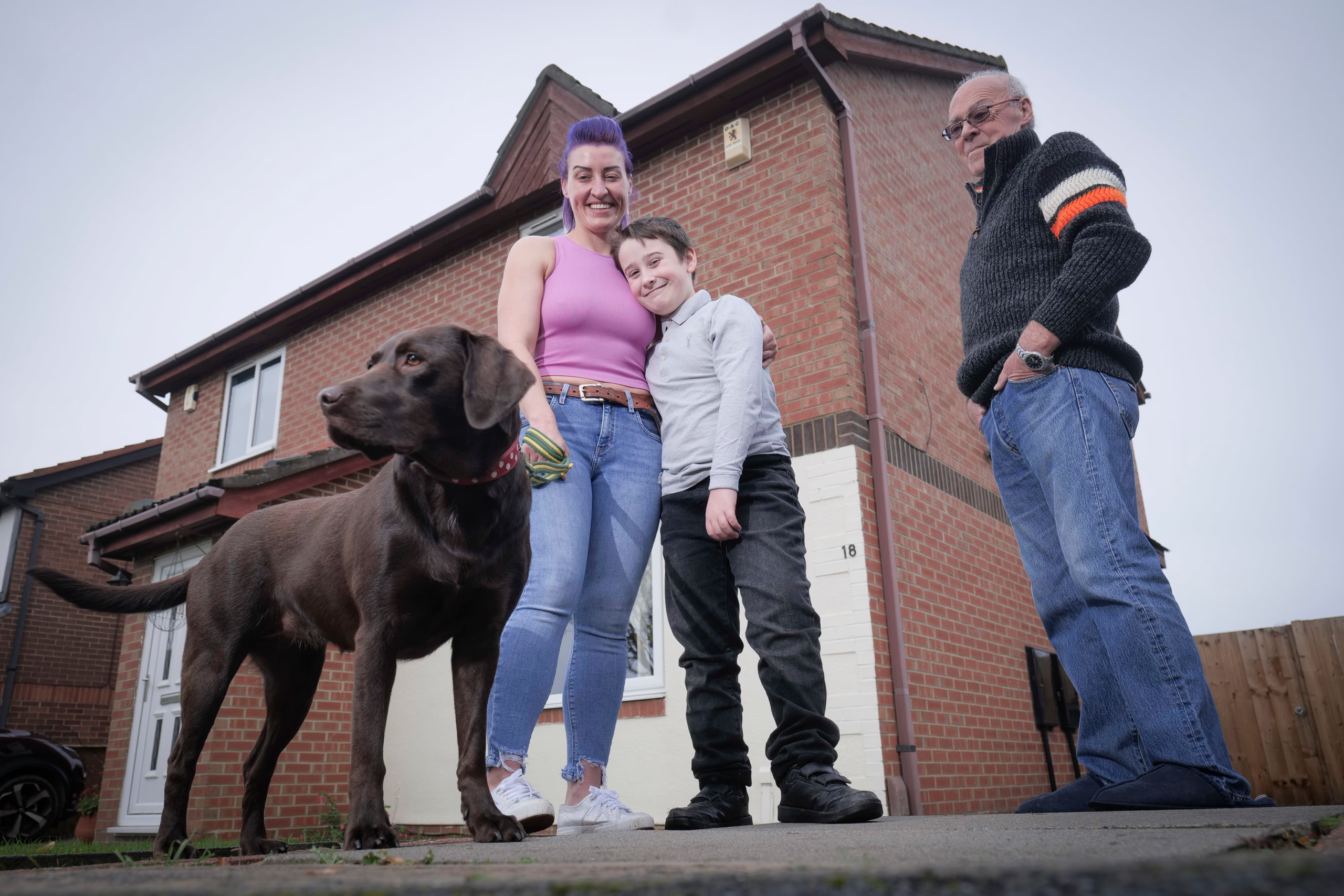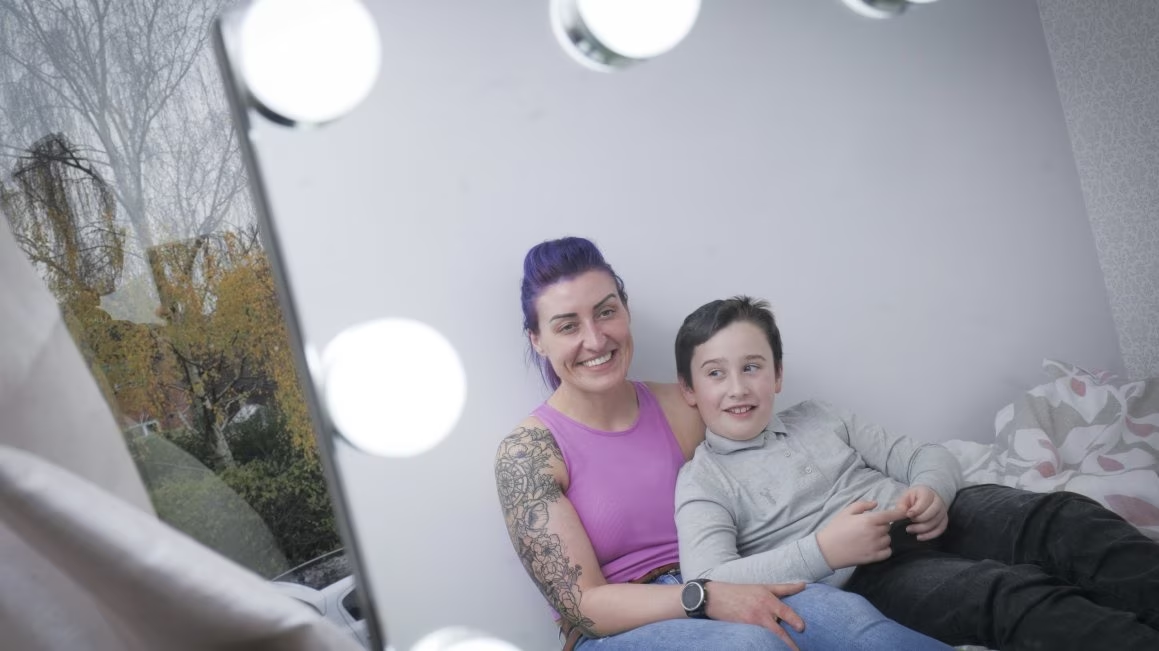Is living under the same roof as your parents and kids hell on earth? Or a savvy alternative to tackle the cost of living? We meet one mum who’s just moved back home with her folks in Darlington, County Durham, and another dad – living 10 minutes down the road – who’s well used to this way of life. Here are their honest verdicts…
The old hands
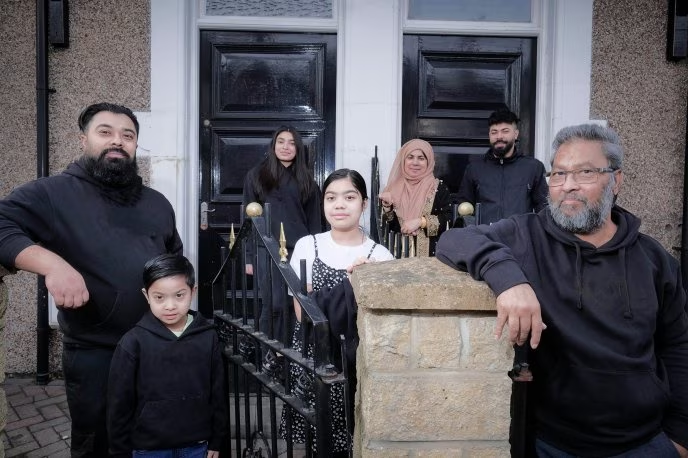
Shuhel Khondokar, 41(far left), lives with his wife Samia, 36, and their daughters Hana, 15, Fiza, 11, and son Sultan, 7. His dad Rafique, 63, and mum Sultana, 60, share the house, as do Shuhel’s brother Zak and his wife and two kids.
‘For a big Bangladeshi family like ours, living with all the generations is just a normal way of life. We embrace it. I was raised one of six children in Harrogate, Yorkshire, with my brother Zak and our four younger sisters. There was always laughter, lively banter, love – and a lot of food!
We moved to Darlington in 1999, for Dad’s work, he was a renowned chef but is retired now, and knocked through two terraced houses to make one.
My sisters moved out as they became adults, or got married, but today myself and my brother Zak still live in the house with our own families as well as Mum and Dad. It’s traditional for many Muslims that sons stay with their parents, while daughters are more likely to live with their own in-laws.
I married Samia in 2004, in an arranged marriage. I was happy to fall in love with someone from ‘back home’ – as we call it – because it would mean she would embrace multi-generational living too. Samia, who works for Amazon, was raised this way. “Family comes first,” she shrugged when we decided to do it. “You accept all your extended relatives and you learn from your in-laws.”
There are enough bedrooms for Mum and Dad, my brother and his wife, me and Samia, and all the kids have their own room. There are four bathrooms, two reception rooms, and one big kitchen diner; we’re not on top of each other.
The financial benefits are obvious – the mortgage, bills and house upkeep are split between us, and a lot less food is wasted. These are the big things in life most people spend on, so we have more disposable income for the things that matter to us, like a nice car or holidays to places like Dubai.
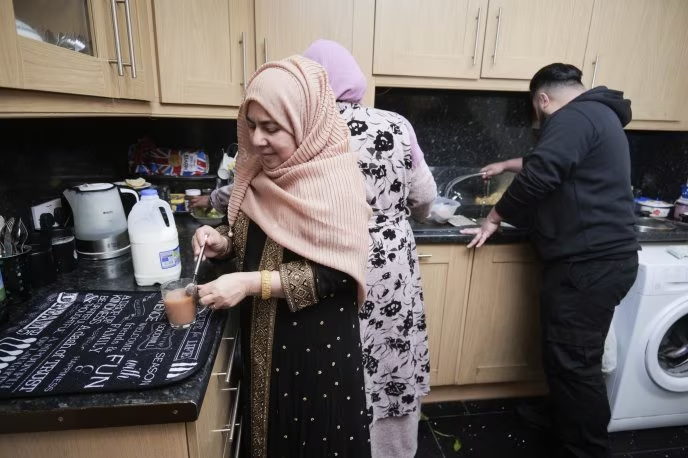
The kitchen is the heart of the house for both meals and chat
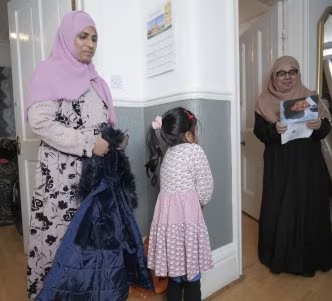

Left: The children are respectful of all the adults in the house.
Right: Two reception rooms allows for a smarter adult space and a family room for games
“The financial benefits are obvious – the mortgage, bills and house upkeep are split between us, and a lot less food is wasted.”
Housework is halved. We’ve never had an official rota, but everyone takes it in turns to do the laundry, cleaning and cooking. If you’re making a “macherjhool” (fish curry) it’s as easy to do it for 11 people as it is for two.
It’s more fun living communally, and makes you really close as a family, no one gets lonely or left out.
We’ve never had to pay for childcare, and now Mum and Dad are retired and both suffering health conditions, we can take care of them. In Bangladesh there is no welfare system, so care homes just aren’t part of the tradition. It’s simply accepted that you look after your elders, like they did when you were young. It’s just repaying the favour.
Of course there are downsides to living this way. “How do you have any privacy?” is the first question people outside the community ask. Luckily for us the house is large with enough rooms for people to retreat to. And we respect boundaries, so all the kids know that if a door is shut they’re not to enter it, couples need time out from the family too!
You have to be more considerate generally, about all mucking in together, not spending hours in the bathroom, leaving mess everywhere, or being noisy when others are sleeping.
My brother Zak and I work in the family restaurant, Babels, so we are often not back until the rest of the family are in bed, so we don’t have the TV blaring.
If anyone has a fall out, which naturally sometimes happens, you give them space. The arrangement wouldn’t work if people had very different parenting styles. The kids respect all the adults, there’s never, “But my mum says I can go to bed later than yours,” that’s just not how it works culturally.
We have two reception rooms, one a ‘smarter’ one where we might welcome visitors, this is where my dad normally is. And we have a relaxed family one, with games and a Playstation. There’s no fighting for the remote control, we’re usually on our own screens.
The rule is that we all have to agree on the decor for the communal rooms, so they’re more neutral. But everyone can choose how they want to decorate their own bedrooms, so Samia and I went for plush fitted cupboards, and have an ensuite, while the kids rooms are full of Marvel figures, neon lights and make-up stations. They treat their cousins simply as “bhai” (brothers) or “afa” (sisters).
The kitchen is where we all gather for meals and chat.
Not everyone would choose to live this way, but for us it’s mostly a happy and harmonious way of life.’
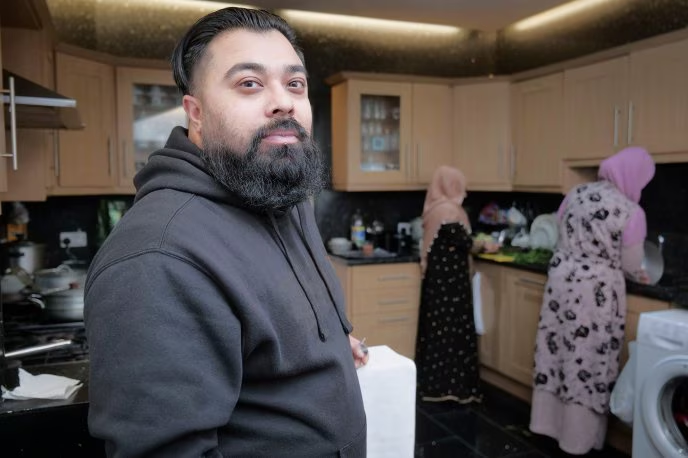
Everyone takes it in turn to cook meals for the whole family of 11 people
SHUHEL’S TOP TIP FOR STACEY:
“After listening to many other Asian families, we soon learned the biggest issue for multi-generational living is the lack of privacy. You really need to draw up boundaries – and respect them. Everyone needs a space, however small, they can retreat to and know they won’t be disturbed. If the door is shut, let them have that time out until they’re ready to join the family rabble again.”
The newbies
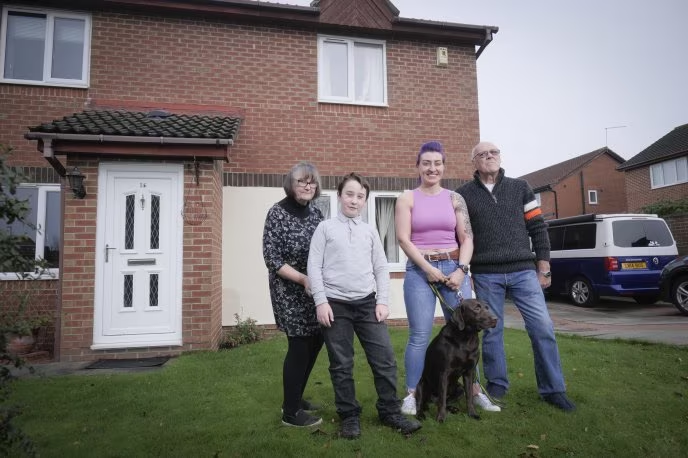
In 2022, personal trainer and NHS worker Stacey Flinn-Scholfield, 38, moved back in with her parents Kathryn, 66, and Michael, 68, along with her son Bear, 10, and her labrador Bramble, for financial reasons when her marriage disintegrated.
‘Finding myself moving back in with parents at my age, with my son and dog in tow, was never the plan. But when my marriage collapsed I needed to leave the family home – and save cash.
Mum was frankly horrified when I announced, “I’m coming to live with you.”
“Why don’t you just make the relationship work?” she asked, as women of her generation do. YOLO is not in her vocabulary!
But she loves me, so of course her and Dad welcomed me back. It’s not my childhood home, they downsized to a small two-bed terraced house when my two brothers and I flew the nest, hardly expecting our return.
It’s not been easy, for them or me, sharing the same roof. They’ve got set in their ways, I can’t just kick my shoes off at the door, and mum describes me as a “whirlwind,” disrupting their peace.
They eat very traditional food like pie and mash, and even lard the pan before cooking. Don’t get me wrong, it’s delicious, but as a personal trainer I prefer healthy meals, and now my chopped-up veg fights for fridge space with their butter and full fat milk. If I mention I like a certain cheese I’ll suddenly find three packets in the fridge. They’re really trying, like I’m trying – with mixed success – to introduce healthy food like chicken and rice.
We rarely eat together as there isn’t really room, only a small table that seats two.
“I’ll be home late Mum,” I warn, feeling weird explaining myself at nearly 40. Returning at 11pm I’ll find Mum still waiting up for me, like I’m a teenager. I’m up at the crack of dawn for my NHS work, and she still gets up to see me off.
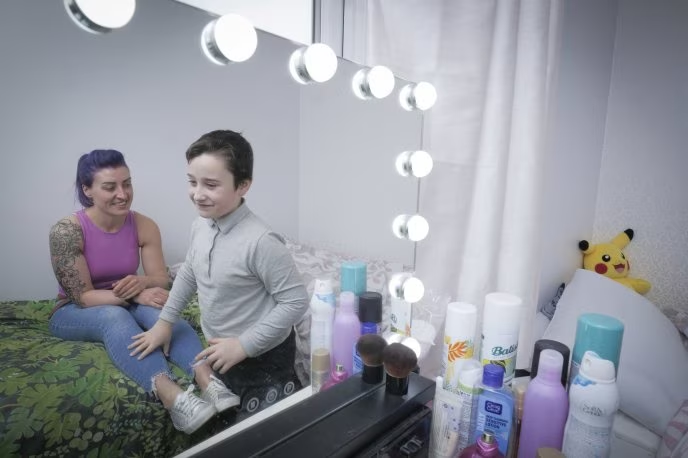
10-year-old Bear enjoys sharing the small bedroom with his mum
“It has brought us closer together. I’ll say to Mum, ‘Come up here for a minute,’ and she’ll perch at the end of my bath while I offload my worries.”
I’ve noticed I revert to more teenage behaviour too. Dad and I are both hot-headed and Mum takes the peacemaker role. “You both want the last word,” she eyerolls, exasperated. She’s annoyed that when she opens the cupboard under the stairs, overflowing boxes tumble out, while I don’t love the fact that she feeds Bear up on toast, crips and chocolate.
The bathroom extractor fan is noisy when you turn on the lights, so I’ve learned to use my phone torch for midnight loo trips rather than wake Dad. He’d never moan to me, but he might to Mum…
I remind myself it’s their home, their rules; we have to learn to coexist.
Bear and I have a single bed each in the tiny L-shaped spare room, which might sound claustrophobic, but actually Bear enjoys bunking up together. He doesn’t care that our clothes are kept on rails and boxes for now. It’s an adventure. “This is fun!” he grins as we have more cuddles in bed than before.
I share custody with Bear’s father so he’s not here all the time. He loves that Nanna and Grandad take him to school every day, and he’s taught them all about Marvel films, dragging Mum to her first cinema outing in years to watch Spider-Man!
I love seeing them all play board games, a welcome change from the Nintendo Switch.
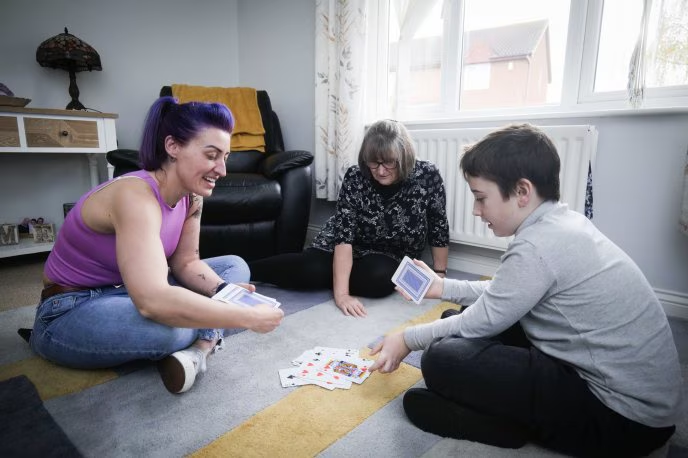
With the influence of Stacey’s parents, they have all started playing cards and board games, rather than being on screens
The move was financially driven for me, and I now feel bad their bills are increasing with us here. Dad took my dog Bramble as well as their Spaniel Penny off to the groomer together and wouldn’t accept my money. Though his reaction when I said Bramble was coming too was, “Oh God”. The dogs playing winds up my Dad, but if only they’d move the lounge coffee table, I say, there would be more room!
We can drive each other mad, but I’ve found Dad sweetly cleaning my car and mending things I didn’t know were broken, while Mum kindly does the laundry. In return I teach them about things like online banking.
It has brought us closer together. I’ll say to Mum, “Come up here for a minute,” and she’ll perch at the end of my bath while I offload my worries. She listens and never judges, though she must be bewildered. Times have changed.
I know of one other person locally who has also had to move back in with her mum with her two kids following separation, so I don’t feel I’m unusual. I imagine it will be a growing trend with more families being forced into living with relatives to combine bills and reduce outgoings… sadly it just makes sense financially in these times, even if it’s a temporary arrangement to help someone get back on their feet.
Life may not always go to plan, but that’s what families are for. To be there when it doesn’t.’
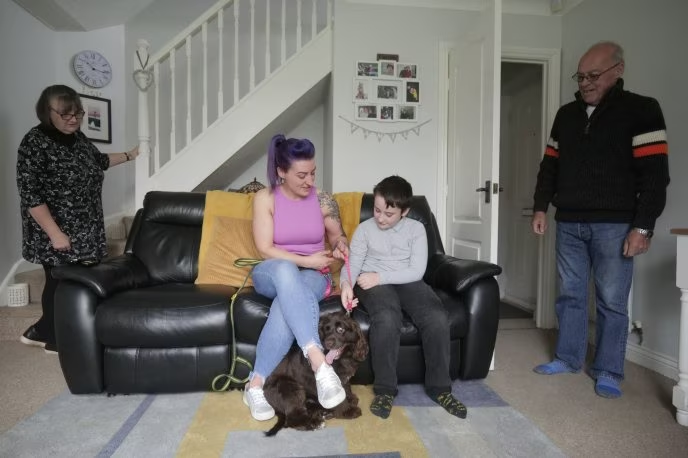
Living together has brought the three generations closer together
How to make the best use of your space
Living with relatives is on the rise. In America, only 7 per cent of US adults shared multi-generational homes in 2011, while a decade (and one global pandemic) later, this has quadrupled to 26 per cent, according to research by Generations United. Sixty six per cent of those living in a multi-generational household cite the economic climate as a factor.
Architects and builders have been prompted to accommodate the growing trend. Even pre-Covid, the UK’s prestigious Royal Institute of British Architects House of the Year winner was a clever multi-generational design.
“People are rethinking their lives dramatically,” says Steve Howat, of construction company London Projects. “We are working on a number of schemes where part of the house is designated for adult children or elderly parents.”
While homes with a basement flat, loft or annexe are a long term investment, for those trying to make an existing space work, these tips are worth considering…
The keys to success
Dealing with the emotional aspects…
“Adapting to multi-generational living can be challenging,” warns Rhian Kivits, a Relate trained therapist and relationship expert. “People can find it harder to relax with in-laws, or worry the older generation will judge their parenting.
The root causes of most problems are boundary issues – where family members’ roles and responsibilities clash – and communication, especially where expectations aren’t clear, or aligned. When partners and in-laws live together there can be marked differences between what they view as normal.
But with understanding, compromise and patience, living in a multi-gen setup can be a unique chance to form strong bonds, with everyone feeling supported and part of an intimate community.”
Rhian’s top 3 tips for making multi-gen living work for all…
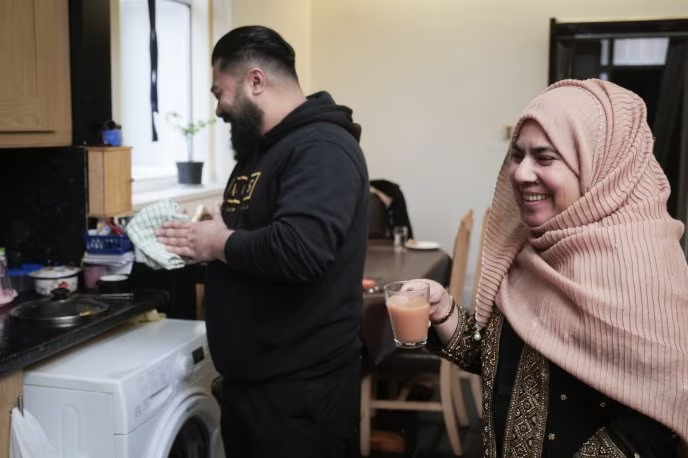
Shuhel in the kitchen with his mother
The 1. Establish healthy, open communication
It’s vital family members share what makes them feel most comfortable. Having ‘family meetings’ can be useful as it feels collaborative, fair and avoids anyone having to act as mediators. Some families like having a set rota for chores, but only when responsibilities have been negotiated clearly and everyone is happy with their role. Appreciate that some people struggle with routine, whereas others love it.
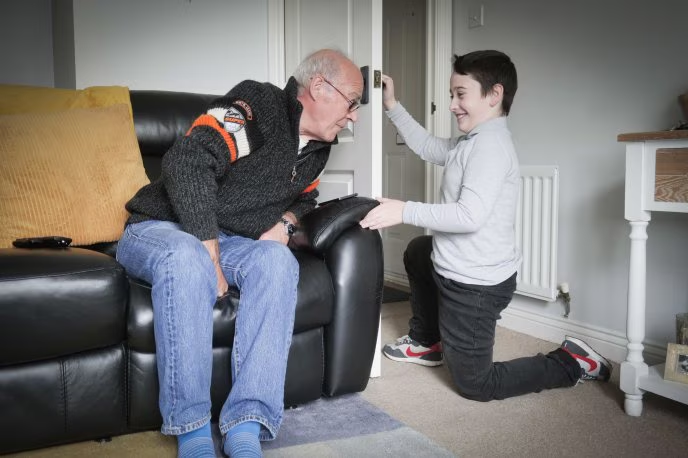
Stacey’s son Bear, playing with his grandfather
2. Beware of childish behaviour (from the grown ups!)
Many adults revert to childhood patterns when living with their parents. Or can fall into codependent behaviours, like seeking permission/approval or deferring decision making to elders. If you’re moving in with parents, you can be grateful for the support, while not letting financial issues create an imbalanced power dynamic. Parents, meanwhile, can struggle to accept their adult children as independent individuals, especially if they’re offering support or money. Power dynamics can be ingrained, but being aware of them helps create more adult to adult behaviours.
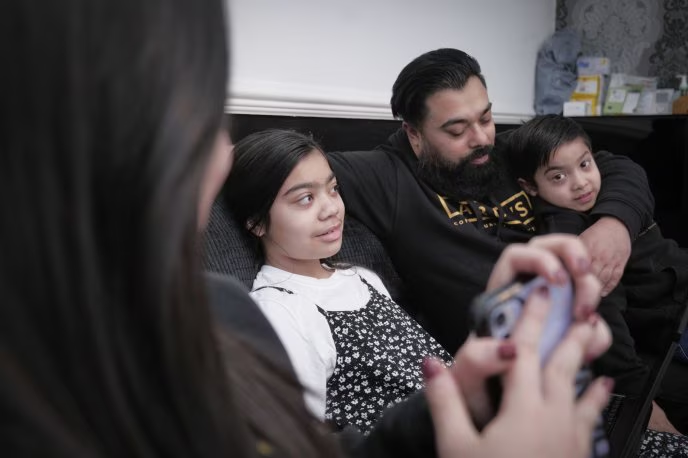
Shuhel and the family relaxing together
3. Respect each other’s differences, strengths and weaknesses
Help everyone feel like they’re making their contribution to the household – they don’t have to be financial. Resolve issues swiftly and kindly to avoid resentment building, better to nip disputes in the bud. Share your feelings together – don’t gossip or complain behind backs – try to really understand each other’s needs and motivations.
For more information about Rhian’s work, see rhiankivits.co.uk
Words: Susanna Galton
Photography: Mark Pinder
